Exponent II's Blog, page 34
March 31, 2025
“Retreating” by Laurel Thatcher Ulrich
Consider attending this year’s Exponent II Retreat on September 19-21, 2025, at the Barbara C. Harris Center in Greenfield, New Hampshire! Registration opens May 3. Learn more here.
This essay was originally published in the Fall 2021 Exponent II magazine. Shared here with permission from the author as part of the Exponent II Retreat blog series.
When Exponent canceled its retreat in 2020 and again in 2021, any relief I felt in not having to deliver a keynote address was overwhelmed by a desire to celebrate the importance of past retreats in my life. This essay is a small gesture in that direction. It builds on a kind of dialogue between the things I remember and the things I have been able to document in my patchy journals. As a historian, I know better than to trust anyone’s memories, including my own. Human brains have a way of shifting things around in random ways. Written records are stickier. In a pinch, they may even help settle an argument. So, my first take-away point from this essay is simple: don’t throw away anything that even pretends to be a journal. The second may at first seem contradictory: cherish your memories. For all their deficiencies, memories often tell us what we care about.
Although I am known for my work on early women’s diaries, I have never thought of myself as a diarist. The small stack of journals I consulted while writing this essay has forced me to reassess that assumption. On top of the stack is a little chronicle I began on July 11, 1953, my fifteenth birthday. Although I managed to keep it going for only nine months, it provides irrefutable evidence that even as a kid I loved Girl’s Camp. It also tells me that early on I was determined to become a writer. My second journal, marked “Record” in gold on the cover, contains only eleven entries between 1961 and 1963. Yet one of these records is my encounter with Betty Friedan’s The Feminine Mystique. “How wonderful in the midst of diapers & dishes — to know that I can be a woman and have brains, too,” I wrote. I added nothing else in that diary for the next 13 years.
I opened it again in 1976. By then, I had five children, ranging in age from sixteen to one. After six years of part-time study at the university where my husband was a professor, I had begun the dissertation that years later would become my first book. Although my life had never been busier, something impelled me to keep adding entries to my once abandoned diary. When I had filled its pages, I switched to cheap composition books, completing five of them by July 1999. I did not write every day. Sometimes I went months without recording anything, and in the last book I wrote on only one side of each page. Without really intending to do so, I created a more than two-decade-long record of significant events in my own life and those of my children. I also captured small moments in the complex history of Exponent II.
 Exponent II Retreat, Hillsboro, New Hampshire
Exponent II Retreat, Hillsboro, New HampshireIf I had written this essay without consulting my diaries, I would have said without hesitation that Exponent’s retreats began on or before 1974. I knew that in the way women often know things: because I connected it with a major transition in my life, the birth of my last child. I believed I became pregnant with Amy shortly after an Exponent retreat held at my house. Since she was born on August 8, 1975, that retreat had to have been held toward the end of 1974. But because my diary entries didn’t pick up until 1976, I had no way of confirming that. That was a problem because the retreat mentioned on Nancy Dredge’s impressive Exponent timeline was at Hillsborough, New Hampshire in 1983.
I consulted several of Exponent’s “founding mothers,” hoping someone would be able to confirm my memory. None of them had the slightest interest in my obsession with chronology. Although two of them agreed that we held retreats before 1983, they insisted that these were “only for the Board.” I didn’t much like that answer because I knew that from the pink Dialogue onward, our group had always prided itself on welcoming anybody who wanted to come to our meetings, even if by doing so we risked having people spread tales about our supposed feminist heresies.
After several days of fussing over this seemingly inconsequential problem, it finally occurred to me to consult our beloved little newspaper. Since I had already given my old issues of Exponent II to the Schlesinger Library, I had no choice but to use the awkward digital edition provided by BYU through Internet Archive. (Many thanks to whoever linked them to the Exponent II website.) When a word search failed, I decided to skim the earliest issues from the beginning. To my astonishment, the headline “Retreat” popped out on page 1 of Volume 1, Issue 1, dated July 1974. That article contained a report of an October 1973 retreat held somewhere west of Boston where the idea for starting the newspaper had begun! Eleven women and several babies had been in attendance.
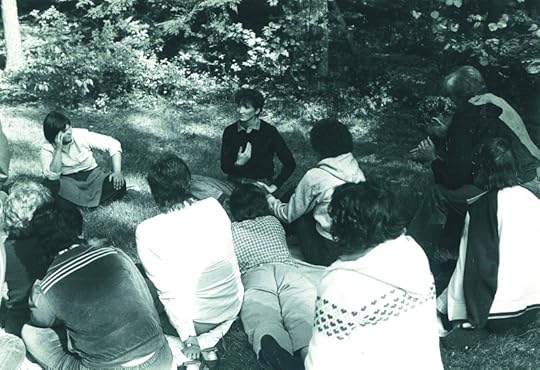 Exponent II Retreat, Hillsboro, New Hampshire
Exponent II Retreat, Hillsboro, New HampshireIt took less than five minutes to reach Exponent II’s third issue. There on the second page of the December 1974 issue was confirmation that “thirty women from Massachusetts and New Hampshire” had recently spent two days “in retreat” in Durham, New Hampshire, at the home of Laurel Ulrich. I was impressed that the number had jumped from eleven to thirty in just one year. The writer explained that there had been delightful meals, jogs in the woods, open discussions, and formal presentations on a variety of topics, including “for some of us,” a discussion of progress, problems, solutions, goals, and dreams related to the production of Exponent II. In short, this was the sort of retreat that hundreds of women have since experienced, a gathering sponsored by Exponent that included both those deeply involved in producing the paper and anybody else who wanted to come. According to the author, the participants came away with a greater understanding of themselves and each other. “The hours were full,” she concluded. So, I hasten to add, was my unfinished house.
I don’t know why it took me so long to consult the paper. I knew in my bones that our gatherings had produced our projects, rather than vice versa. Everything our little group had accomplished since 1969 had begun with open talk, gabfests like the one I documented in my diary on January 7, 1979. Held in Judy Dushku’s living room, it had begun as an “Emmeline Press Meeting,” then devolved into a late-night sharing of “disillusionments & testimonies” produced by a “seeming link between politics & pronouncement from Salt Lake.” One participant asked, “How can the Church do this to my testimony?” But true to form, we felt better after talking it through.
I do not know when and how informal gatherings such as this one led to retreats. I suspect Carrel Sheldon, who had some experience with then-popular self-realization groups, may have suggested the form. Some of the retreats I mention in my diary occurred in people’s homes or vacation houses, others in what were probably rented spaces. People who were involved in the paper invited friends to join them in the same way we invited others to a church event. In May 1982, I took a friend from my ward in New Hampshire to a retreat held in Framingham, Massachusetts. In my diary, I noted the presence of “a large group of single women & many young mothers.” I explained that because Judy, Carrel, and a couple of others I had expected to see were not there, Bonnie Horne and I attempted to fill the gap. I wrote that we “felt very maternal.”
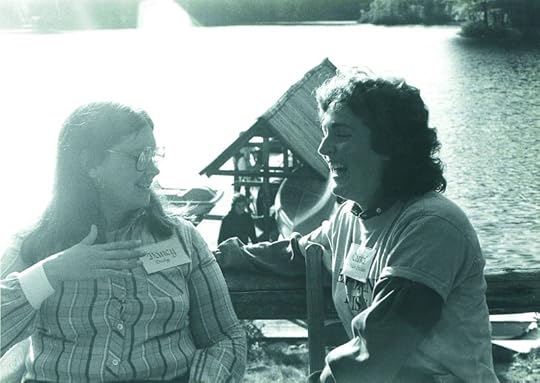 Exponent II Retreat, Hillsboro, New Hampshire, circa 1983
Exponent II Retreat, Hillsboro, New Hampshire, circa 1983For me, the biggest surprise in my diary accounts was how integrated these early retreats were with my activities in my own Latter-day Saint congregation. In fact, the earliest full description of a retreat in my diaries is the one for October 8, 1978, organized by the Portsmouth Ward Relief Society. I noted, “Much anguish & dissatisfaction expressed. But also — much sisterhood & sharing & a generally ‘I can cope now’ feeling by morning.” That sounds a lot like an Exponent retreat to me. I had obviously been free in sharing my enthusiasm for such events with local Relief Society leaders. One of my favorite diary entries records attending two retreats back-to-back: “I left the Portsmouth Ward women’s retreat at 7:30 a.m. after staying up most of the night & drove to Harvard, Mass for the Exponent retreat. What a feast of contrasting & harmonizing colors, tastes, sounds, & feelings!” Yes, these events were both contrasting and the same. When given time and an atmosphere of support and openness, women talk. When we feel understood and supported, we talk more and become stronger.
My diary entry for March 7, 1981, was filled with family news. It mentioned that I had sent the revised draft of Good Wives to my publisher. In the midst of the jumble, I added: “The Exponent retreat here circa February 6 was marvelous. See Nancy’s editorial in the paper.” That editorial appeared in the Winter 1981 issue under the title “Retreat and Rejuvenate.” It explained that because recent retreats had become a bit haphazard, the organizers had been more ambitious in planning this one. I think anyone who has ever attended an Exponent retreat would recognize its description, including its emphasis on food. Nancy reported that Exponent’s “in-house gourmet chef,” Linda Othote, had brought all the ingredients for a fabulous but simple menu and organized us into crews to put each meal together. I still have recipes from that retreat. My husband, who had decamped to Boston with our children, returned home just in time to see departing retreaters stuck in a snowbank. Although I can’t prove that it actually happened, I have a vivid picture in my mind of Mimmu Sloan single-handedly lifting a bumper out of a rut.
Histories of Mormon feminism often refer to us as “the Boston group.” In fact, few of us lived in Boston proper. Our home area, which extended from New Hampshire to Rhode Island, was one node in the creation of what Leonard Arrington called Mormonism’s “unsponsored sector.” From the beginning, we were connected with writers, editors, subscribers, and readers from similar nodes in Washington, D.C., Chicago, Denver, Provo, Salt Lake City, Berkeley, and beyond. My diary records a surprising number of in-person as well as virtual encounters with like-minded women based in such places.
In May 1982, some of us participated in the “Nauvoo Pilgrimage,” an event organized by women historians who had been meeting together in Salt Lake City to discuss their research on early Latter-day Saint sisters. As a way of honoring the 140th Anniversary of the founding of the Nauvoo Relief Society, they welcomed 53 women to a three-day event in Nauvoo. For those of us who had grown up with idealized portrayals of our pioneer foremothers, the presentations by Carol Cornwall, Maureen Ursenbach Beecher, Linda Newell, Jill Derr, and Lavinia Fielding Anderson were transformative. I love the snapshots somebody took of us hamming it up in a Nauvoo sculpture garden. We both embraced and pushed back against the sanitized legends that had shaped our lives. For most of us, the highlight of “Pilgrimage” was the so-called Quaker Meeting on the final morning, where the poets and the non-poets among us tried to capture the spiritual meaning of what we had learned.
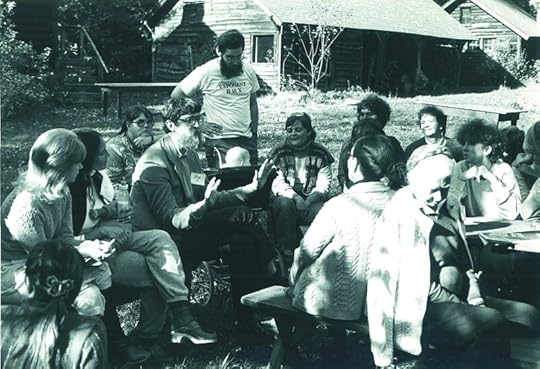 Exponent II Retreat, Hillsboro, New Hampshire, circa 1983
Exponent II Retreat, Hillsboro, New Hampshire, circa 1983Pilgrimage helped inspire Exponent’s first truly national retreat, a three-day event held in October 1983. We called it the “Exponent Reunion,” perhaps because we hoped to see the return of women who had worked with us over the years and then moved away or who were connected to us and each other only through the paper. Sue Booth- Forbes spent much of the summer looking for just the right setting. She found a circa 1922 camp in Hillsborough, New Hampshire, run by two amazing sisters, Harriet & “Puffy” (Priscilla) Nissen. As I wrote in my diary, Hillsboro Camp had “a pond, beautiful woods, surrounding fields with bell-ringing cows, and log cabins with names like Sing-Sing, Bug House & Doggy House, and with genuine five-hole outhouses.” For me, the outhouses brought back memories of being at my grandfather’s cabin in Big Springs, Idaho, where an acre of bubbling springs produced a fork of the Snake River. Our New Hampshire site was not quite that magical but it was impressive.
The home-cooked meals were among its charms. Harriet and Puffy and their helpers served homemade bread and rolls, jams from local berries, salads filled with fresh vegetables including sweet-tasting summer squash from nearby farms, and eggs and meat from chickens that had been fed from our dinner scraps. According to my diary, 100-120 persons attended. Other accounts reveal the presence of six or seven somewhat dazed men. When I read my own description, I was stunned to realize that this was also the retreat where novelist Virginia Sorenson and her cousin, labor activist and consumer advocate Esther Peterson, spoke. In memory, I saw us introducing them to a space that we already loved and had made our own. No. We met both our new site and members of Mormonism’s so-called “lost generation” at the same event. In my diary, I described our guests as “two lovely ‘ex-patriots’ who nevertheless reflect Mormon ways.” Although both left Utah and apparently the Church in young adulthood, they both carried much of their Mormon heritage with them.
I knew Virginia Sorenson’s novels quite well because the essay I contributed to Mormon Sisters had explored fictional portrayals of pioneer women, a genre in which she excelled. I was thrilled to meet her and listened intently to her description of her struggle to find herself as a writer. She was not only eloquent but had a self-deprecating sense of humor. She quipped that she had been married twice “with a little overlap in between.” I have a more vivid memory of Esther Peterson. I believe we were all together in the big room with the twiggy sign over the fireplace that read “May the fires of everlasting friendship burn.” People were sharing their woes when Esther gently raised her hand and said something like, “But wouldn’t it help to look beyond ourselves?” She asked if we remembered a Sunday School song that she then began to sing: “Have I done any good in the world today? Have I helped anyone in need? Have I cheered up the said, or made someone feel glad? If not I have failed indeed.”
It was a surprising moment, the outside radical, the labor organizer, and “Great Society” appointee telling us to remember the lessons we had learned in Sunday School. I don’t think I made up the moment toward the end of the Reunion when I heard Esther express her appreciation for having been invited and then said, “Perhaps if we had had something like this when we were younger, we would have stayed.” I wanted to believe that was true.
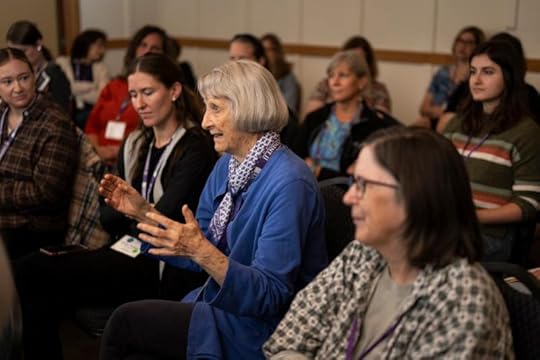 Laurel Thatcher Ulrich commenting at the 2024 Exponent II Retreat in Greenfield, New Hampshire. Photo Credit: Anna Ream
Laurel Thatcher Ulrich commenting at the 2024 Exponent II Retreat in Greenfield, New Hampshire. Photo Credit: Anna ReamI attended many more Exponent retreats after that. I wrote about some but not all of them in my diary. On July 22, 1996, I copied a scripture I had discovered at the latest one. It was from the Sermon on the Mount, Luke 6:38: “Give and it shall be given unto you; good measure, pressed down, and shaken together, and running over.” Obviously something interrupted me, and I didn’t complete that entry until a month later, when I wrote, “I feel like my life has indeed been pressed down — compressed into high-density land — and still runs over! Is this fullness? Or a kind of excess — an overabundance that leaves one frantically trying to grab more [?].” With some irony, I added, “A drop can be delicious.” By the time I made that entry, my children were grown; I had won a number of prizes for my historical work, and I had just joined the history faculty at Harvard University. Although I loved the work I was doing, I was daunted by the unexpected attention I was receiving. Over the next twenty-five years, Exponent’s retreats helped keep me sane. I look forward to the next one.
Laurel Thatcher Ulrich is a Founding Mother of Exponent II and a retired professor living in Bala Cynwyd, PA.
Sign up for the Exponent II monthly newsletter to stay updated with announcements and retreat registration information.
March 30, 2025
Upcoming Launch Party for the “Radical Kindness” Issue of Exponent II
Join Exponent II and dozens of readers and contributors for our launch party for the Spring 2025 issue of Exponent II magazine on April 10th at 6 p.m. MT / 8 p.m. ET.
Register for the Zoom link at tinyurl.com/exiiparty
In this issue we asked contributors to tell us their stories of “radical kindness.” This issue delves beyond simplistic takes and showcases different lived experiences, putting them side-by-side in conversation.
Alongside an array of theology, prayers, poignant poems, artwork, and interviews with immigrant artists, “Tiny Kindnesses” are peppered throughout the issue. We curated these tiny stories in the spirit of Rachel Hunt’s work (@tinykindnesses) of recognizing, naming, witnessing, and documenting the many kindnesses that happen — even in the thick of stress and chaos. No intentional kindness is ever small.
Join us for a sneak peek of this outstanding issue and to honor all of our amazing writers and artists!
Guest post: Let’s talk about sex, baby ex-Mo
By Elizabeth
Amid all the sex ed and sex talks I did or didn’t receive growing up, none of them prepared me for my reality: middle-aged virgin leaving a high-control religion, sporting a fervent desire for a sexual awakening (casual, committed or otherwise) but saddled with a lot of shame and uncertainty around sex and a general awkwardness around the opposite sex.
After I left the Church of Jesus Christ of Latter-day Saints some time ago, I decided it was time to get laid. Puberty was three decades ago, menopause is probably only a decade in the future. No time like the present, right?
Except my life of only dating Mormon men—and only dating a few of those; not dating has by far been my norm in the three decades since I turned 16—stumbling through terrible interactions on LDSSingles.com, watching other Mormon friends seemingly figure this out easily and being reminded constantly that a) we date to get married and b) we do not do anything of a sexual nature and c) everything will be fine on the wedding night because you’re both virgins and it’s cool now, I find myself woefully unprepared for finding a sex partner. Do I have to get on the apps? *shudder* How do I explain that I’m in my 40s and have never had sex? How do I explain Mormonism and how every sex-adjacent experience I’d had up to now has left me guilt-ridden, both enjoying it and hating it, knowing I’d have to confess to a bishop what I’d done? How do I cope with my own insecurities about my body, my attractiveness, the way I look naked? How do I actually know if I’m ready for this? How can I not be ready after all these decades?
I hadn’t gotten this sex talk. So I found my own. Here’s my sex talk: How to Lose Your ‘Virginity’ at 43
I emailed Slate’s How To! podcast with the above subject line, explaining my situation and asking for help. They found Nicole Hardy, author, speaker and former Mormon who, in 2013, wrote an essay for The New York Times Modern Love section in which she described the strange state of being in her 30s and never having had sex.
We talked for more than an hour. Our experiences weren’t the same, and I knew I wouldn’t be approaching a sex life in exactly the same way she had, but it was refreshing to talk to someone who’d felt this way too, who’d had the concerns and insecurities and didn’t know where to start, who’d been both discouraged and encouraged by men along the way. We talked about how the ideas around sex that we’d grown up with often weren’t healthy, they weren’t always positive and they didn’t prioritize pleasure, especially for women. We talked about how broken we’d felt, how religious trauma had wormed its way into our brains and whispered lies and doubts, how sometimes the voices of the world said those things too.
This journey has been (and continues to be) full of twists and turns; before I share my thoughts from my conversation with Nicole, I want to share some of what I’ve thought as I left Mormonism and decided to become sexually active—how the things that I’ve been taught have affected my relationship with my sexuality and my body for most of my life and how I’m trying to overcome them now.
Sexual neglectThe email to Slate happened around the time I listened to a “Mormon Stories,” episode titled “Therapists Combat Mormon Sexual Shame.” The guest, therapist Erika Nordfelt, briefly mentioned how ignoring sexuality was a form of sexual neglect. I remember where I was, what I was doing, what time of day, what day of the week it was when I heard that because it felt like being punched in the gut. I stopped what I was doing, paused the podcast and just sat as the truthfulness of that washed over me, followed by the gut-wrenching realization that this is what I had done. For decades, I neglected myself as a sexual being, I ignored and shoved down and felt guilty about having sexual feelings. Sometimes I saw my body as a kind of double agent—it could run and hike and swim and move furniture, but it also had these biological urges that I wasn’t allowed to do anything about, that got aroused at times when I was kissing my boyfriend and imagining what could happen next, even though it couldn’t. I thought we were on the same team, but my body made my life harder.
I wonder now, if over the years as I was shutting down those normal feelings and wanting to be desired but also not and berating my body for being too big or not attractive and ping ponging between disordered eating habits, if my body also thought, “Hey there … I thought we were on the same team. Why are you treating me like this?”
Sexual shameI remember hearing a story in church years ago about a young man who, on the eve of his temple sealing, called his father into the father’s office, sat down behind his father’s desk and told his father solemnly that he, the son, wanted his father to know he was as pure as the day he came into the world. His father was moved. I felt sick. I couldn’t say that. I dreaded the day I’d meet “the one” and I’d have to confess that in college, I fooled around with my boyfriend. (In colloquial ‘90s terminology, I believe we got to first base.) I was so embarrassed that I’d been so weak, humiliated that I’d let this man down.
Ironically, in the last few years, when I thought about potentially dating (in the abstract, not even with a man in front of me), I’ve also been filled with embarrassment, but this time at the thought of confessing that I’d never had sex. I was way past the point for that to be normal or even just quirkily late. No, it was just weird and a little wrong. Somehow, I managed to have sexual shame on both ends of the spectrum—I’d done too much and I’d done too little.
Now that I’m looking at options—of sex, of dating, of having intimacy of any kind, even the G-rated variety, with a man—I’m trying to tamp down the embarrassment. Yeah, we’ll have an awkward conversation about sex and just how inexperienced I am. But I don’t want to see that as a flaw or a problem, just a reality that we’re working with. I’m hoping having that as a test of sorts will help me find more understanding men.
Sexual safetyBirth control was top of the list. I went with an IUD on the recommendation of my doctor. I was not prepared for an IUD insertion. I knew it likely would be painful; I’d heard plenty of stories from friends and on the Internet. I mentally prepared, took ibuprofen and reminded myself that I’d been getting pap smears for years, and while they are unpleasant and uncomfortable, I got through them, and I’d get through this.
What I hadn’t counted on was the doctor needing to use a dilator because my cervical opening wasn’t large enough. The next minutes … 2, 5, I don’t remember–it felt like ages but certainly was not … they were the most painful of my life. I’d take the knee injuries, the searing pains of burning my hand on a hot pan, the migraines that used to leave me lying prostrate on the couch, unable to move. I was nauseated and sweating. The nurse told me my face went gray; she wouldn’t let me close my eyes because she needed to know I hadn’t passed out. When the doctor stopped, they wouldn’t let me sit up on my own and made me wait half an hour and down Gatorade and crackers before I could leave.
I was shaking. I was also worried. Two questions persisted: Would sex be painful or difficult? Was God punishing me for wanting to have sex?
One of those questions was reasonable. One of them was the product of decades of teaching by fear and shame—that bad things happen if you break the rules, no matter how arbitrary or harmful those rules are. That God is angry and vengeful. That those feelings and my body were bad, that what I was doing was bad. That I was committing the sin next to murder. I worry those feelings, which I know are irrational, will loom over this experience.
I did not get an IUD; I later got Nexplanon, which is an arm implant and has similar side effects and effectiveness. And hurt not at all when I got it.
Sexual confidenceI’m still working on this. Besides some of the logistics that we talked about, this is where my conversation with Nicole helped the most. She told me that early on, a man told her, “No man wants to be your teacher.” She worried about that—that men were looking for sexual partners who were experienced. It turned out, she found men who were happy to be her teacher. And it wasn’t a matter of “taking” someone’s “virginity”—a construct I really hate for all sorts of reasons that I won’t get into here—as some sort of sexual trophy, but of experiencing sex with a new partner, experimenting, demonstrating what they like, communicating, laughing together and more. It will be awkward, she assured me—don’t worry about it. Find someone you can laugh about the awkwardness with. Find someone who cares about your pleasure, and make sure you care about theirs as well. Find someone you can talk to. She suggested looking for feminist men and becoming a part of sex-positive communities in looking for a partner.
This is my next step—finding someone. Experiencing the podcast as a listener, being able to remove myself from it somewhat and without the burden of needing to participate, also allowed me to reflect on past relationships and how ill-equipped I was to find good men. I haven’t had any relationships that I would call healthy. I might have to try the apps. I’m preparing myself to call the friends who’ve already volunteered to set me up. I’ve looked around for ex-Mormon spaces. And as I do so, I’m reminding myself that I’m not weird, that there’s a man who would love to teach me about sex, that it is healthy and good that I want this. It’s an upending of everything I’ve been taught, and that’s difficult and uncomfortable and a little scary. But not wrong or evil.
Now, please wish me luck as I go forth to join Tinder.
Photo: A butterfly pea flower, scientific name Clitoria ternatea. Taken by S Kahn, used under Creative Commons license and resized by author.
March 29, 2025
Unlocking the Exponent II Retreat—A Guide to its History, Traditions, and Purpose
Consider attending this year’s Exponent II Retreat on September 19-21, 2025, at the Barbara C. Harris Center in Greenfield, New Hampshire! Registration opens May 3. Learn more here.
If you’ve never been to the Exponent II retreat, it may seem a bit mysterious. What exactly do all those Mormon feminist women and gender minorities do in the New Hampshire woods for a weekend each September? And why do so many keep coming back?
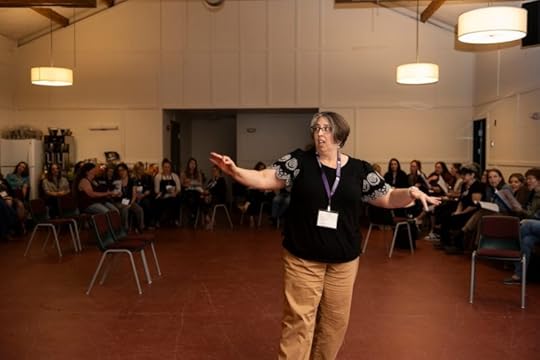 Photo Credit: Anna Ream
Photo Credit: Anna ReamA friend who attended the retreat for the first time in 2024 told me that without a guide—someone who has been before—it’s easy to feel lost in the traditions. Some things aren’t explained outright—like, what are “Spiritual Autobiographies”? What happens at the Sunday morning “Quaker Meeting”? Why are Friday night introductions done that way? What are the vibes of the workshops and the variety show? How churchy will the retreat feel? How “Mormon” do I have to be to feel comfortable there?
Then there are the privacy requests. Attendees want what they share in confidence to remain confidential. Some attendees prefer to keep their participation private to avoid potential backlash from employers or church leaders. Out of respect, participants are asked to get consent before posting photos or sharing details online, making it unclear what can be discussed outside the retreat.
While Heather Sundahl and I were curating pieces for Fifty Years of Exponent II, a scholar friend pointed out how little had been written about the retreat. I was surprised—so much had been published in Exponent II magazine and on the blog! But I realized that much of it isn’t easily searchable, making the retreat feel even more elusive to those on the outside.
Famously, the first rule of Fight Club is, “You don’t talk about Fight Club.” However, the Exponent II retreat is not Fight Club, and it does not require the secrecy of temple rituals. We can talk about it while still respecting the privacy of what people share.
That’s why we’re launching this blog series—to be your guide to the retreat’s history, traditions, and purpose. Whether you are considering joining the retreat this September or are just curious about what goes on there, this series is for you.
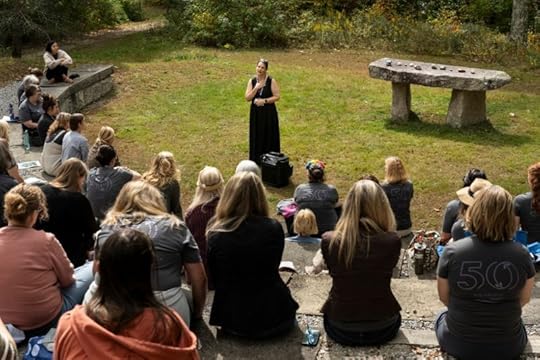 Photo Credit: Anna ReamWhat this Exponent II Retreat blog series will offer:
Photo Credit: Anna ReamWhat this Exponent II Retreat blog series will offer:Over the following months, we’ll post pieces from the Exponent II archives alongside new reflections on the retreat experience. I’ll update this post with links as we go, but here’s a preview of what’s coming:
Retreating—an essay by Laurel Thatcher Ulrich about the history of the Exponent II retreat (published in place of the 2021 retreat keynote address, which was canceled due to COVID-19)Retreat Friday Nights—an essay by the late Carrel Sheldon, an Exponent II founding mother who developed the tradition and intentions behind the way we do introductionsInto the Woods—an essay by Exponent II Vice President Lindsay Denton about the meaningful rituals and community the retreat brings into her lifeSpiritual Autobiographies—an introduction by Exponent II Founding Mother Judy Dushku and a spiritual autobiographical essay by an anonymous longtime retreat attendeeWhat Happens in New Hampshire. . . Exponent II Retreat Reflections—memories and reactions by recent attendees (and what keeps them coming back!)The Nauvoo Pilgrimage—essays by Melodie M. Charles and Charlotte Cannon Johnson about the original 1982 Mormon feminist “Pilgrimage” to Nauvoo that influenced the format of Exponent II’s first national retreat in 1983, launched the network of Mormon feminist Pilgrimage retreats, and introduced the practice of the Sunday morning Quaker MeetingExponent II Retreat Highlights: Variety Show, Workshops, Keynotes & More—a roundup of blog posts and archived essays to give a taste of what to expect at these eventsOde to Hillsboro Camp—a collection of memories of Exponent II’s original retreat location in Hillsboro, New Hampshire (1983–2000)Retreat through the Years: Insights from Fifty Years of Exponent II—an essay by Katie Ludlow Rich, rounding out the series with thoughts on how the retreat has shaped the organization and communityIf you have attended the Exponent II retreat and would like to share a short recollection, please fill out this survey (bonus—you don’t have to answer every question!). If you feel inspired to write a guest post (600–1,600 words), please send it to KatieOnTheBlog at gmail.com.
Sign up for the Exponent II monthly newsletter to stay updated with announcements and retreat registration information. As this series develops, read more blog posts about the Exponent II retreat.
 Photo Credit: Anna Ream
Photo Credit: Anna Ream
March 28, 2025
Guest Post: My Discovering of God’s Unconditional Love
by Rose
A month after I turned nineteen, I sat beside my dying father’s hospital bed to tell him goodbye. He died five days later while I was attending school at Brigham Young University. My distraught, destitute, chronically ill mom was grief-stricken when her soulmate passed so I made funeral arrangements with my half-siblings. I returned to school after the funeral feeling overwhelmed with life. My dad and I had been remarkably close, and I missed him terribly. I couldn’t foresee how I would finish school without his help and had some heart-to-heart visits with God on my half-hour walks to school each day. I told God I was afraid, lonely, and overwhelmed. I wanted desperately to finish school, and I couldn’t picture how I would do so without my dad.
After a week or two of these soulful visits with God, one afternoon as I walked to school and poured out my heart to Him, I felt like He was physically embracing me. He told me He loved me unconditionally and that I would be okay. He revealed to me that His love is infinite and eternal, not only for me but for everyone on earth. He showed me the unfathomable beauty of the world He had created and whispered to my heart that I was not alone.
This singular event transformed my life. With divine help, I finished school in three years and completed a master’s degree in the fourth. I met a wonderful man when I began my master’s degree, and we have been married for fifty-five years.
I wish I could say that I have always held the knowledge of that transformative experience close to my heart, but life happens. Post-partum depression, chronic anxiety, and traumatic events have sometimes stripped the knowledge that God genuinely loves me from my heart. In the past decade, I have undergone eight major surgeries which have at times left me feeling frightened and confused. Sometimes I wonder why I must suffer so and why so many on earth are hungry, unhoused, and without hope. At times, the weight of humanity’s suffering seems crushing, and I long to make a bigger difference in the world around me. For the time being, my biggest contribution to the world seems to be stringing words together and loving others fiercely.
However, in moments of contemplation, I can sometimes recapture the visceral knowledge I once had that God loves me infinitely, just as he loves everyone else. That may be the only thing I know to be true. As my foundational attachment to the LDS Church has unraveled, I still cling to my trust in a Divine Power that loves everyone on earth unconditionally. I believe They love their children as fervently as I love mine. Nothing my children could do would cause me to love them less. I believe in a God that loves like that–and more.
When I hear my religious leader talk about a God who loves others conditionally, I wonder if he has experienced God’s unfathomable love in the way I have. I am writing this to remind myself—and perhaps you as well—that you are enough and that you are magnificent just the way you are today. A God who loves anyone less would not be worth worshiping.
Rose finds joys in serving the marginalized and in speaking up for them.
March 26, 2025
Guest Post: Thoughts on Repentance
by SG Davis
I sat in Sunday School – reluctantly. I had come to realize that church was hard for me. I frequently left feeling empty and frustrated. I had not heard much about Jesus, love, hope, empowerment in living in a long time. And I recognize that for some, the current tone of Sunday School is good.
I thoughtfully decided to attend today with my daughter. My reasons make sense to me and I will leave it at that.
Mid-lesson – another on the lost 116 pages – had come to a point of a section of verses talking about the adversary, the ever present and paradoxically elusive Satan. As I listened to fellow congregation members share some thoughts about how real Satan is and that we need to teach the youth that he is indeed real. And, it’s not good that there are those who do not believe Satan is real. I wrestled with my hand going slightly up, and then down again. I looked at my friend next to me and she said, “just say it.” So, up my hand went.
My thoughts were focused on agency. We are free to act or be acted upon. Why are we not talking about how empowered we are with our agency? We can choose, and we can learn from our choices. This lesson was hitting me differently today – what if we can look to the lesson as a reminder to follow our personal revelation? Sometimes, we can’t go back and redo to make things better. What if God is teaching us that we can pick ourselves up, acknowledge our choice, and move forward choosing differently? Could that be a lesson here? What if we empowered our youth with their agency? What if we teach them that Satan only has power if you give it to him – if you do not consciously act and you are acted upon? We can be empowered by actively using our agency.
The teacher acknowledged this, stating we will talk more about personal revelation in a few weeks.
As the lesson progressed, I began to wonder why we are spending time talking about 116 lost pages and how it was so hard because of Satan. Is this really helping me in my day-to-day life? How will this discussion edify me and provide me with strength to carry on in this real-time history we are living in?
The lesson continued and after a comment was shared, the teacher asked, ‘what is the prophet telling us to do today?’
A hand went up. “Repent.”
Another voice followed and repeated, “he’s telling us to repent just like Joseph was telling the people.”
My heart sank. I noticed a few heads go down.
Thankfully, the teacher added that there is a message of love. But, that was it and onward the lesson went.
In my thoughts, I was wondering,
“Repent of what? Why isn’t there a message of love? Of lifting where we stand? Of being aware of those in our communities and supporting how we can? Why is an institution that claims to teach of Jesus Christ not encouraging it’s members to be actively engaged in their communities? To be present with those most vulnerable? To let go of insisting that we all see the world the same way and making sure people have food, safe shelter, and health care? Am I missing something?”
Why are we sitting in a church building on Sunday talking about 116 lost pages and how much power an unseen devil has over us? Why are we actively handing over our innate power to think and make sense of things for ourselves? Why are we, in some senses, wallowing in how hard it is instead of actively ministering to those around us? Damn the differences and diversity. If we cannot treat each other with the dignity of being human, what are we repenting of?
So, I return to my initial question: Repent of what?
I didn’t raise my hand this time. I sat with my thoughts. I left church very unsettled. I long for messages of a loving Christ, of meeting people where they are, of prioritizing people and good principles over policy and divided views. I long for community that has room for me and all of the ways my life does not meet the checklist of “righteousness and blessings.”
I awoke the next morning with new thoughts.
Are we all speaking of repentance with a common definition? My hunch is that we are not. I have found that in many Sunday School settings, repentance carries a heavy feeling and command to follow the prophet, go to church, pay tithing, attend the temple, clean the church, etc. There is a common belief of a real separation from God when we don’t fall in line. (I don’t believe that from my own experiences with the divine.)Is it any type of repentance without reflection, inquiry, and a decision to change in, of, and for oneself? Will it be a change for optics? Will it be a change for transformation?What would happen if we stopped in lessons and defined repentance and provided examples of what it might look like in our lives?What if we looked at the word repentance in different languages and the definition and usage? Estonian has two different words that early missionaries disagreed on when we were using early translations of discussions. One word means a change of mind, the other means a change of heart.What if the repentance we are asked to engage in is a return to acting as Jesus did? Where did he spend most of his time and with who? Was he calling them to repentance and telling them loudly how horrible they were if they were not in church, paying their tithing, etc.? Was he talking to them as a person? How did he treat them? The woman at the well? The invitation to the disciples? Mary Magdalene? How do I see and feel Jesus in my life?What if repentance is coming back into alignment with god, with our divinity, with our inner knowing?What if it’s simply doing better when we know better?What if repentance is changing how we live and show up in relationships to move toward more active listening? Learning to love in different and deeper ways? Awakening to a remembrance of who we are and that we are empowered and endowed with the capacity and ability to learn and to grow? That we can change our minds, hearts, and behavior (with practice) when we have new and different understandings?What if the invitation to repentance is a call to engage with our communities, to add our voice to changes in policies that care for the real needs of our vulnerable populations?What if the invitation to repent is a call to analyze our mindsets and to release the fear?
SG Davis is sometimes walking confidently and sometimes wandering haphazardly through her midlife awakening and transformation. She is a human, a woman, a mother, an educator, a coach, and encourage of all things good.
March 25, 2025
A Few More Days to See the 50 Years of Exponent II Exhibit at BYU!
The BYU L. Tom Perry Special Collections has a 50 Years of Exponent II Exhibit for Women’s History Month! The exhibit is up for the month of March in the Special Collections lobby and was curated by Karen Glenn, John Murphy, and Bethany Budge.
Exponent II staff began sending material to the BYU archive in 1977. As described by Katie Rich, co-author of Fifty Years of Exponent II, “the exhibit captures the full sweep of Exponent II’s work — from Laurel Thatcher Ulrich and the Cambridge Relief Society producing A Beginner’s Boston, to Susan Kohler uncovering the original The Woman’s Exponent in a Harvard library, to Woman’s Exponent Day Dinners in Grethe Peterson’s backyard, to Carolyn Person’s hand-drawn art. Every stage of their process — mailing personalized requests for submissions, editing essays, advertising discussion groups at Judy Dushku’s house, collecting fan mail — has been preserved and a beautiful snippet is on display.”
Rich said, “It was an honor to see this collection in person…This archive was essential to find the sources to write Fifty Years of Exponent II. We are so grateful to Karen Glenn, John Murphy, and Bethany Budge at the library for curating this exhibit and organizing the Exponent II Records to make them even better for future researchers.”
Curator Karen Glenn said in a correspondence to Exponent II, “Thank you for the wonderful opportunity to work with these records. It was a sacred experience to preserve all of these stories from Latter-day Saint women.”
Check out the collection’s newly updated Finding Guide as well as the archive of digitized issues of Exponent II.
Photos by Katie Rich featuring Nancy Dredge and Judy Dushku as well as Katie Rich and Heather Sundahl and the exhibit’s curatorial team.
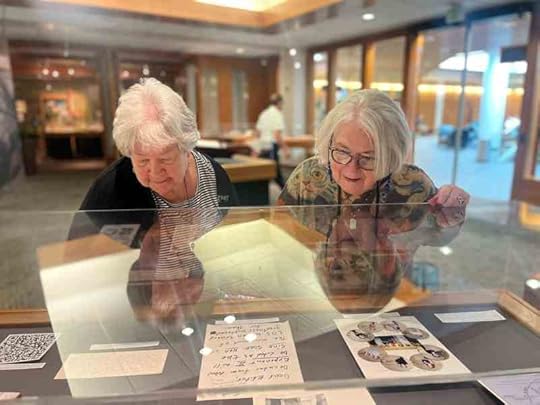
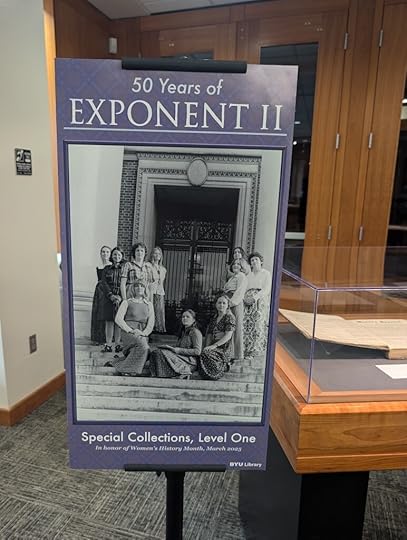
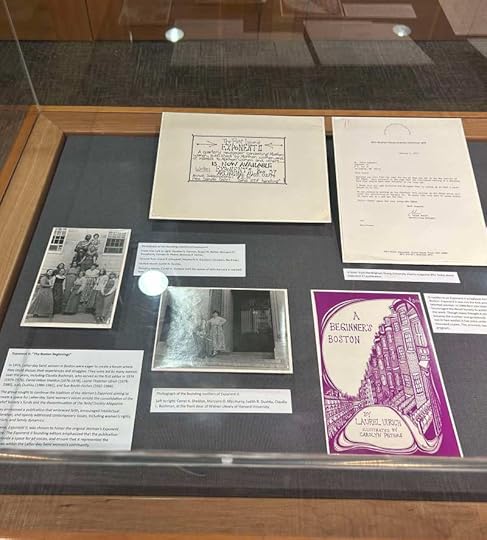
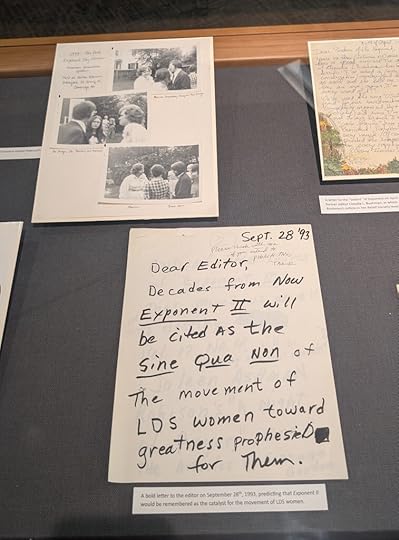
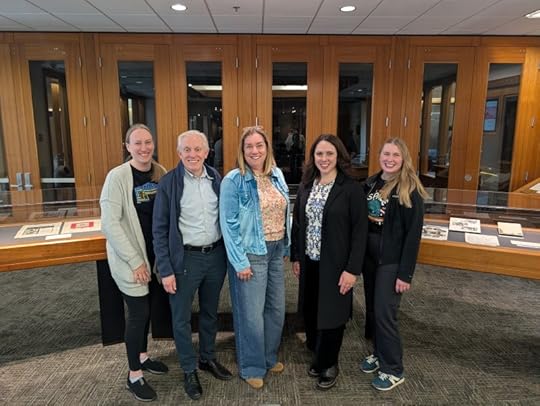
March 24, 2025
Obedience With Exactness

Photo by Marcelo Silva on Unsplash
My family and I sat on a blanket in the crowded grassy field of the Orem Owlz stadium eagerly awaiting the start of a game. The warm breeze carried the smells of kettle corn and the words of the women sitting in front of us. Their familiar layered MOD shirts outlined the garment lines matching the church content of their conversation. I tried to tune out but later one of the voices became raised in clear frustration and I heard “He’s 5, he knows how to brush his teeth. His tooth had a cavity! I told him “you owe the tooth fairy money!””
Being a mom of 2 young children at the time, I looked at mine and thought about what I had heard. Is that what I’m supposed to do? Am I spoiling my kids by not having this rule or thinking this way? Motherhood is the divine role of women in the church and I found myself always wanting to be a better one, recognizing that my own mission in this world was to raise children up in righteousness. As an LDS mother, I often felt that I wasn’t doing enough and listening to other moms at church would often bring my insecurities to the surface. I wasn’t good with discipline or structure and I saw these as deficits in my parenting. I viewed the moms with elaborate chore boards and a tiered system of consequences with the same awe as my teenage eyes viewed the prom queen, in other words, entirely out of reach.
We are taught “Motherhood is more than bearing children. It is the essence of who we are as women. It defines our very identity, our divine stature and nature, and the unique traits our [Heavenly] Father gave us (Sheri Dew).” To qualify for celestial exaltation, one must be a righteous woman who raised her children in righteousness. As Sister Dew said, “mother is the word that will define a righteous woman made perfect in the highest degree of the celestial kingdom, a woman who has qualified for eternal increase in posterity, wisdom, joy, and influence.” Being an LDS mother is an extraordinary, high stakes, lifelong tightrope walk isn’t it?

Photo by Sean Benesh on Unsplash
Mothers are expected to teach and enforce obedience as it is the first law of heaven. Obedience is supposed to keep children safe and expand their faith. It is the law for which all others are predicated upon. If we are to raise children in righteousness, obedience is a measuring stick. Failing to obey is associated with wickedness in the scriptures and leads to the destruction of person and of entire peoples. With that outlook, no wonder so many LDS members become very focused on their children’s’ obedience. Children and adults alike are commanded to obey God, even when we do not understand why (Nephi 3:7).
When I watched the recent documentary about Ruby Franke, the Mormon vlogger imprisoned for the abuse of her children, a phrase she used tore right through me. She said her children needed to display “obedience with exactness.”. This phrase comes from the Book of Mormon, and is spoken by the prophet Helaman about the 2,000 stripling warriors. He said: “Yea, and they did obey and observe to perform every word of command with exactness” (Alma 57:21).
The stripling warriors were a group of 2,000 young men who were taught in righteousness by their mothers. They were obedient and thus all spared from slaughter in war. Primary children sing a song about this army that proclaims “We have been born, as Nephi of old, to goodly parents who love the Lord. We have been taught and we understand, That we must do as the Lord commands.”
The church manual Preach My Gospel, used in church classes and missionary training states, “ you are expected to keep the commandments willingly, to obey mission rules, and to follow the counsel of your leaders. Obedience is the first law of heaven. It is an act of faith. You may sometimes be required to do things you do not completely understand.” We see this same expectation throughout scriptures and in talks by leaders, church history lessons, and often parents.

Photo by Alex Shute on Unsplash
I think our society has grown increasingly focused on exact obedience within religion but also within our social structures. I can’t go a day without hearing something along the lines of “why didn’t they just obey?” with no thought about potential other factors. This position can silence others and in extreme cases lead to abuse.
We are witnessing real time examples of this in the Lori Vallow Daybell and Ruby Franke cases. A court affidavit states “Lori Vallow also told Gibb that Tylee had turned into a zombie when she was 12 or 13, which was approximately the same time Tylee had become ‘difficult’ to deal with” This sounds eerily similar to Ruby Franke’s diary entry which states “If he wants to emulate the Savior, he needs to be a hundred percent obedient with exactness.” I think it’s highly likely that both mothers started out with good intentions to teach their children the first law of Heaven and to save them from wickedness, but exact obedience led to dehumanizing their children to the point of abuse and death.
It is developmentally appropriate for children to push boundaries and/or need to understand the whys in their lives. While this is true of all children, it’s especially true of our children who are on the Autism Spectrum. For these children, knowing the why is critical to understanding the rules, the patterns, and to increase their understanding of the world around them. Children on the spectrum are often misunderstood as being disrespectful when they are truly to make sense of what is being asked. They are also disproportionately abused..
In an organization that commands exact obedience, it’s important to be aware of its negative potential and be equipped to prevent it.
If you suspect child abuse, call the Childhelp National Child Abuse Hotline at 1-800-4-A-Child or 1-800-422-4453, or go to www.childhelp.org. All calls are toll-free and confidential. The hotline is available 24/7 in more than 170 languages.
Communion In Paradise
It is a small island.
There are no high rises. There are resorts, many of them large and quite new. They are located some distance from the one main road which follows the circumference of most of the island.
We landed later in the evening. As we pulled our suitcases off the baggage carousel, the handles broke off on both of them. Manhandling them on and off the shuttle, we picked up the rental car and drove to Kapa’a. The complex was only a few miles away. We walked across the parking lot, through a gate, along a walkway behind some small houses where clothes were hanging on lines in the back yards, to the stair at the end of our building.
Our daughter and son-in-law had arrived earlier. They helped us carry the broken baggage up to the 3rdfloor. The apartment was in an older building, built in the 70’s, clean and simple. From the door, we looked down on the small houses that fronted the main road. We walked through to the small kitchen and living area, out to the balcony on the other side. We could hear the rush and boom of the waves, and see the shifting white line appear and churn and fade as the waves formed and broke and pulled back to form again. In the dark, the water was moving. There were silhouettes of palm trees bending over the waves.
We were grateful for the dinner they had made for us. There wasn’t much nourishment offered on the journey here.
We unpacked our most important items – snorkel, mask, fins, wetsuits, dive shirts, cameras. We did not come here to shop.
The next morning we put on clothes that didn’t seem to belong near a beach, and drove a short way to the cluster of church buildings. Each building had large windows or doors along each side to allow air to circulate. One building had the kitchen and gym, another was a row of classrooms and offices. We walked between them to the third building, where we entered one of the many large glass French doors which lined the long sides and back of the chapel. A man slid over to give us room on the pew. Several people turned to smile and greet us, and the sound of a small choir singing a lovely prelude floated through the background in a rustle of movement. People whispered, murmured or spoke, depending on what they felt they could do before the prayer, or maybe what they felt they could do anywhere when they express love and fellowship.
The breezes moved through the open doors, and the ceiling fans slowly spun. Women in flowing, light dresses, sat next to women with flowers in their hair, in brilliant colored tank tops and linen shorts, girls and boys in jeans sat with girls and boys in skirts and suits. Pale hands were intertwined with richly dark hands.
Man in lava lavas and boys in long pants carried trays containing the bread and water emblems along the aisles. One of the young women directed a young man toward a row of visitors, and then took the tray to pass the symbols of the blood and body of Christ along.
A talk by Patriarch Enos referred to the early missionaries to the islands. He was old enough to have known my parents when they served their mission in Samoa and Hawaii 70 years ago. Then there was a salt-of-the-earth talk from a high councilman who had a southern accent. We sang “How Great Thou Art” led by a chorister who testified with her hands as she conducted, and another sister testified as she prayed her benediction.
I got to explore the island with people I love, walking along beaches where people from island mythology walked, and along reefs where tiny creatures scurry around my feet, and my daughter wonders at the life around her. She finds crabs that are barely the size of a grain of sand, moving over the larger shell of another crab. We looked beyond the waves at whales breeching the surface of the water.
We learned there is a site of ancient ruins on the islands. It was a navigation school. Young people from far away would gather here to learn the language of the sea, the sun, moon, stars and sky. They could learn how to find their way to a small island many miles away, by the feel of the water, the life below and above the water surface, the movement of the air, the shape and color of the clouds, and the position of the stars. All things were connected to them. In their seeking and exploring, they learned to be guided by the one-ness of all things.
We came from thin, dry air to rich, moist, thick air. I felt a bit out of regular time. Clocks do not seem to run the same way here. Finding balance while walking on sand required different muscles. The clumsy awkwardness of stumbling in shallow waves while slipping fins onto my feet, gives way to weightless ease when I push off from the ground, and extend my body over the water surface. Breathing through the snorkel, I looked down through my mask into the vividly clear water. The shallow reef dropped down below me. Slowly, I moved my legs and gradually shifted my arms, moving out to deeper water. Colorful fish came into view, more than I could count. I noticed when larger shapes came up from the deeper ledges and caves of the reef. Reef sharks slowly glided through the sand channels. Sea turtles seemed to be flying as they smoothly moved their fins to rise to the surface for air, then back down to nap under the reef, or find the cleaning fish. We were in the water at sunrise, so we got to see the turtles feeding on sea plants. I saw a very large turtle relishing a large clump of green sea moss, and I carefully positioned myself a few feet away to watch. After a few moments, I saw there was another turtle feeding a few feet below me, and another on the other side of me, and one just in front of me. I tucked my arms in and kept my legs still, trying to experience the closeness with these creatures as they feasted, feeling honored to be in their presence.
Later, we drove south, and made our way to the great canyon in the middle of the island. Our favorite view was on a high ridge that is between the canyon on one side, and the stunning Na Pali Coast dropping down to the ocean on the other. We stood there as clouds shifted, concealing and then revealing sections of the cliffs that had eroded over time to these dramatic formations. We turned from the canyon to the right, to look out over the water on the left, where the sharp, vertical ridges seemed to plunge down into the sea.
I saw the rainbow emerge from the shifting clouds, and was pleased to see it forming over the ridge. There seemed to be an unseeable finger slowly tracing the colorful arc higher over the ridge. I held my breath as it continued over and down into the canyon. I stood in awe as I saw an almost complete circle of color, from the coast on one side, reaching over the ridge and connecting to the canyon on the other. Standing there, seeing the contraries of vast water, sharp rock, lush forest, dry cliffs, shifting clouds, sun, shadow, brilliant color in a smooth arc – spreading across many miles, viewed from a great height. I felt I could reach out and touch all things.
In times of despair, I recall the promise of new life in the symbol of the rainbow, and in the invitation to communion. Connection that is not limited by time, or distance – connection which relishes diversity – this is love. This is hope. This is the warrior hope that shows up in the midst of devastation, that calls us to reach out and hold on to each other.
In connection, in love, in hope, we create new worlds. We create paradise.
March 22, 2025
An Open Letter to Elder Renlund
Dear Elder Renlund,
Thank you for recently acknowledging that leaders of the Church of Jesus Christ of Latter-day Saints can do better at addressing gender imbalances–and that you will. Your comments come at a time when an increasing number of women (and men) we know are dissatisfied with these imbalances, resulting in many of our wonderful friends and family members decreasing their enthusiasm in the Church. We wish to communicate some thoughts and ideas for “low hanging fruit” solutions to rapidly ensure women that their lives and contributions are valued on par with men.
A guiding frame for these ideas are those that we feel can be readily changed without broader doctrinal and theological changes (such as pertaining to priesthood ordination). Such changes are needed from the top, as otherwise local leaders have limited power to improve gender relations in substantive ways. These ideas are not necessarily new or original to us (see, for example, Neylan McBaine’s Women at Church). Our focus here is on improvements we perceive as the easiest and most obvious that also have strong potential to increase inclusion and improve morale in the Church.
1. Significantly increase the number of women speakers at General ConferenceThis change is perhaps the easiest way to unambiguously communicate a shift in the Church’s concern about women’s leadership and participation. We see no scriptural, doctrinal, or practical reason why this cannot happen. General Conference ought to be a time when members are inspired and excited to be Latter-day Saints, but, sadly, for many women it is a reminder of how it appears to be a low priority for the Church to hear from women. What is keeping church leaders from taking this simple step in rectifying this tremendous imbalance in speakers?
2. Increase opportunities for women and men to serve together, and in leadership roles beyond those focused on women and childrenOur understanding is there are no scriptural or doctrinal reasons that women cannot serve as clerks, ward mission leaders, Sunday School presidents, or mission zone/district leaders, for example. One practical consideration might be a reticence for women and men to serve together (e.g., as members of a Sunday School or Primary presidency). But this is also a reasonable area for reform; church members of younger generations have grown up in personal and occupational contexts where women and men work together. It is also consistent with the Church’s recent emphasis on councils and is already reflected in some leadership contexts (e.g., Stake Communications). Relatedly, allowing for mixed-gender co-teachers of Primary classes (beyond married couples) would enable some wards to be less reliant on women for these roles. Another idea is for stake/ward councils to aim for gender parity; this certainly can be achieved in nearly every ward and stake. And why not something like a stake women’s leadership council? We can imagine women’s leaders and High Council leaders taking turns in their speaking assignments to wards/branches in their stakes.
3. Make every effort for the contributions of “young women” (ages 12-18) to be on par with those of “young men“Women’s perceptions of their importance and place in the Church begins when they are younger. Girls see the differences shown to boys and they are not impressed. We recognize priesthood implications in this regard–and we are aware of some recent minor improvements–but we see no reason why advancement in Young Women’s cannot be met with equal visibility as for young men’s priesthood offices in sacrament meeting. Further, we are aware of no doctrinal or scriptural reason why women/girls cannot assist with preparing for and passing the sacrament. If this suggestion is met with concern about boys feeling distinctly important and valued, then we hope that the irony of that response is obvious.
4. Increase the visibility and participation of women as much as possibleIn a Church with a male priesthood and scriptures that are written by men and with mostly male characters, it is imperative to increase the visibility and participation of women in the Church. Why not have women sometimes conduct sacrament meetings (a mere task that could in theory be delegated to anyone)? Why not have more artwork in meetinghouses that portrays women and girls? Why not systematize women’s participation (if they choose) in the blessings and ordinances of their children (e.g., standing in the circle)? Much more can be done; there are surely other excellent ideas.
5. Eliminate gender differences in certain temple sealing policiesWe acknowledge recent changes to improve women’s experiences at the temple. However, deeply painful policies persist. Perhaps most significantly, asymmetry in temple sealing practices and their semblance to past plural marriage practices might be rectified. We urge for leaders to consider making sealing rights and policies identical for men and women. Such is already the case for deceased men and women, and so we do not see an inherent reason for this imbalance persisting for the living.
6. Reconsider language about “presiding“We are sure we are not alone in failing to understand how it is possible for husbands to “preside” at home while spouses also act as “equal partners.” We appreciate the Church’s more recent emphasis on “partnership,” but this emphasis combined with language of “presiding” is both confusing and suggests inherent inequality–that men fill a superior and more authoritative role in marriage. What is gained by keeping this language in marriage contexts? We suggest it may be outdated and do more harm than good. In contrast, in church leadership contexts, the Handbook of Instructions does not indicate that “presidents” of Relief Society, Young Womens, or Primary ever “preside.” What does it mean to have a president that does not preside? What is lost by simply stating that these presidents do in fact preside at their meetings?
In ConclusionThese ideas are just a start. We recognize, respect, and validate that many Latter-day Saint women express that they need much more substantial change than listed here in order to be satisfied with their Church membership. Nonetheless, we feel that rapid changes along the lines of those suggested here would be a healing and hope-offering olive branch to many women.
Perhaps you disagree with some of these ideas, or there is important context we do not understand. If so, then why not explain these disagreements or provide these contexts to the membership? For example, though women (and men) have repeatedly expressed concern about the low number of women speakers at General Conference, we are unaware of a single instance where a general church leader has acknowledged that concern and given a reason for the status quo. Greater dialogue and transparency on this and other matters may itself show that church leaders take the concerns of women seriously and feel a sense of obligation and accountability to minister in ways that treat them as equals rather than subordinates.
Again, we are sincerely grateful, Elder Renlund, for your recent comments on this matter. We understand that the context we are discussing precedes your leadership and is broader than what you can change on your own. As President Nelson wisely said, “Good inspiration is based upon good information.” We hope and pray that more inspired changes are coming, in order to unambiguously show women (and men) that “all are alike unto God” (2 Nephi 26:33).
Sincerely,
Candice and Dennis Wendt



